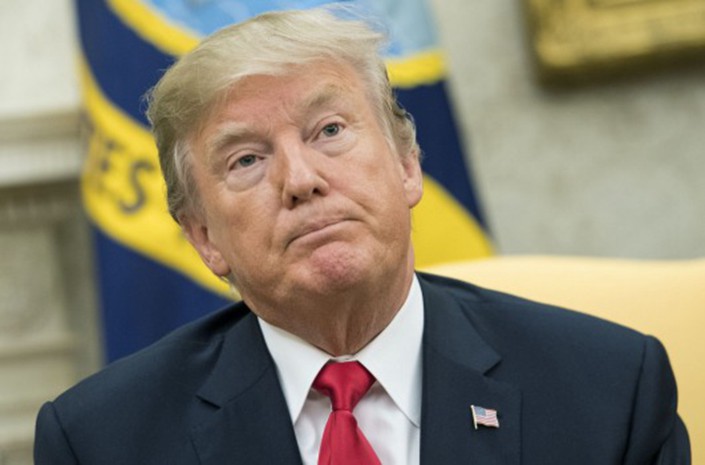Opinion: Trump’s China ‘Poison Pill’ May Hit Australia

(AFR) — A China “poison pill” prescribed by Donald Trump for close U.S. trade partners should send a shudder through Australian business boardrooms.
The renegotiated North American Free Trade Agreement, tacitly agreed to this month, gave the U.S. virtual veto rights over Canada and Mexico signing free trade deals with China.
After decades of generally supporting China’s integration into the global economy, Washington is now in the formative stages of trying to dislocate commercial supply chains between Beijing and America’s foreign partners.
The U.S. is fed up with China’s theft of intellectual property from American companies, commercial cyberattacks, forced technology transfers, state subsidized firms and limited U.S. access to Asia’s largest economy.
An extreme scenario mapped out by finance policymakers at the International Monetary Fund meetings in Bali last week was the possibility of Trump eventually escalating his economic attacks on China by pushing for Iran-style multilateral sanctions.
Such an acute move, however improbable, would force countries such as Australia to choose between doing business with China (our biggest trade partner) and the U.S. (our largest foreign investor and security ally).
In parallels to the Cold War, it is already becoming clear the U.S. will sometimes lean on allies to choose between the competing American and Chinese systems.
The difference today is the global economy is much more intertwined and China’s economy is bigger than the USSR was, so the economic ramifications could be wide-reaching.
Considering more steps
Derek Scissors, a U.S.-China economic expert at the American Enterprise Institute in Washington, says the U.S. is considering more steps “that would move closer to forcing countries to limit their trade and investment with either China or the U.S., especially in advanced technology.”
Australia has a free trade agreement with Beijing because — unlike the U.S. — Canberra recognizes China as a “market economy.”
The U.S.-Mexico-Canada (USMCA) trade pact obliges the countries to tell Trump three months in advance before negotiating a free trade deal with a “nonmarket economy” — code for China.
If Canada or Mexico strikes a deal with Beijing, the U.S. could terminate the USMCA with six months’ notice.
Peterson Institute for International Economics senior fellow Chad Brown says the U.S. is saying that, “When it comes to China, it is either us or them.”
While the China-Australia free trade deal will not be unwound, it is not hard to imagine the U.S. pressuring Australia to more tightly scrutinize commercial relations with China in other areas such as technology and infrastructure.
The U.S. may prefer Australia limit supplying China dual-purpose technologies that have both civilian and military uses.
Emerging technology
Australian university collaborations with China on research and development, particularly in emerging technology such as artificial intelligence and quantum computing, could face scrutiny.
Fergus Hanson, Australian Strategic Policy Institute head of international cyber policy, says the U.S. seems to be pressing its allies to “muscle up to China”.
“Traditionally, the U.S. has leant on allies on commitments for troops in Iraq and Afghanistan and it hasn’t really gone much into the trade space and the need to pick sides,” he says. “On critical national infrastructure like telecommunications and software in critical systems, there will be growing interest around supply chain security.”
The Pentagon this month published a report that suggested Australia, Canada, Japan, the U.K. and U.S. co-operate more on the defense industrial base — potentially limiting links to China.
Zack Cooper, a Republican-aligned Asia security expert who worked in the George W. Bush White House, says business deals involving critical infrastructure and defense technologies will face “a lot of pressure” from Washington.
The U.S. made it patently clear to the Turnbull government that it would be problematic for their intelligence relationship if Australia allowed China’s Huawei to supply technologies to 5G wireless networks in Australia. Huawei was blocked from participating on national security grounds.
In 2016 then-treasurer Scott Morrison stopped Hong Kong’s Cheung Kong Infrastructure and China’s State Grid Corp. buying half of NSW power distributor Ausgrid. Fairfax Media reported the electricity infrastructure was critical to support the joint U.S.-Australia military surveillance facilities at Pine Gap in the Northern Territory.
Australia will not always submit to U.S. preferences.
The Obama administration ultimately failed to dissuade Australia from joining the China-orchestrated Asian Infrastructure Investment Bank.
But Trump is a much more imposing leader, especially when he uses tariffs as leverage over incompliant allies, as he has done with Canada, Europe, Japan, South Korea and Mexico.
The U.S. is retaliating to China’s protectionism with its own attempt at “multilateral mercantilism” against Beijing, meaning Australian business and policymakers face harder choices.
This article was originally published by The Australian Financial Review.
Read more about the China-U.S. trade war.
- 1Cover Story: China Carves Out a Narrow Path for Offshore Asset Tokenization
- 2Drownings Shake Chinese Enthusiasm for Travel to Russia
- 3Over Half of China’s Provinces Cut Revenue Targets
- 4Li Ka-Shing’s Port Empire Hit by Forced Takeover Amid Panama Legal Dispute
- 5In Depth: China’s Mutual Fund Industry Faces Overhaul After a Banner 2025
- 1Power To The People: Pintec Serves A Booming Consumer Class
- 2Largest hotel group in Europe accepts UnionPay
- 3UnionPay mobile QuickPass debuts in Hong Kong
- 4UnionPay International launches premium catering privilege U Dining Collection
- 5UnionPay International’s U Plan has covered over 1600 stores overseas





